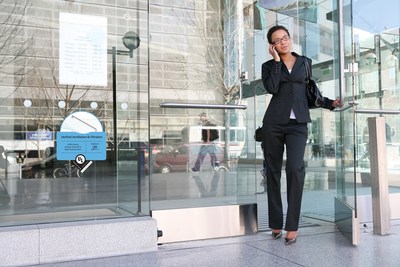|
01.11.2022 15:10:00
|
SafeTraces Announces Phase II U.S. Air Force STTR Grant
PLEASANTON, Calif., Nov. 1, 2022 /PRNewswire/ -- SafeTraces, Inc. a leading provider of indoor air quality verification, announced it has been awarded a Phase II Small Business Technology Transfer (STTR) contract by AFWERX to advance the development of a field-deployable, accurate application of its indoor air quality verification solution, veriDART®.
SafeTraces, Inc. has been awarded a Phase II STTR contract by AFWERX to advance its veriDART(R) solution for the USAF.The Department of the Air Force (DAF) began offering 'The Open Topic' SBIR/STTR program in 2018 which expanded the range of innovations the DAF funded and now on July 22, 2022, SafeTraces started its journey to create and provide innovative capabilities that will strengthen the national defense of the United States of America.
The USAF has selected the veriDART® solution for its unique ability to measure pathogen risk and to deliver recommendations for potential adjustments to HVAC systems to improve the quality of indoor air. The veriDART solution also enables the USAF to reduce pathogen exposure, while optimizing HVAC systems for sustainable energy consumption. Originally a spin-off of Lawrence Livermore National Labs, SafeTraces has developed veriDART by leveraging its patented, synthetic DNA-based tracer technology to safely mimics aerosol pathogen.
At a time when it has become increasingly critical to keep Air Force personnel and their families healthy as they work and live indoors, the USAF needs to be able to rely on proven technology that can quickly measure pathogen exposure and to take remediate action if warranted. Additionally, the technology used for indoor air quality verification needs to be easy to use for field personnel and deliver rapid results.
"The Air Force relies on its people to execute each of our daily missions and this STTR effort, in conjunction with SafeTraces and the University of Colorado Boulder, has the potential to be a game changer," said Lt. Krisan Herbst, Edwards Air Force Base. "We look forward to participating and advancing air quality, pathogen reduction, and decreasing energy consumption."
Through a highly competitive awards-based program, AFWERX' STTR Program funds cooperative R&D projects with small business and non-profit US research institutions, such as universities. SafeTraces is honored to collaborate with the University of Colorado Boulder (CU Boulder), Professor Shelly Miller, Department of Engineering, and her team on this award.
"The University of Colorado Boulder is excited to partner with SafeTraces on this STTR R&D contract. We look forward to bringing our years of experience and expertise to help Air Force personnel and their families, said Professor Shelly Miller, CU Boulder. "The application of aerosolized synthetic DNA as a tracer for respiratory aerosol emissions and other liquid aerosols is novel, and this STTR effort will provide additional insights to help eliminate risk and aid the Air Force's mission."
The USAF and AFWERX have partnered to streamline the STTR research process to speed up the experience, broaden the pool of potential applicants and decrease bureaucratic overhead. The goal is to increase mission readiness by rapidly identifying, applying, and scaling technology essential to the operation and sustainment of the United States Air Force.
In collaboration with CU Boulder, SafeTraces will advance its technology for the USAF to deliver the results of its veriDART assessments faster using new advances in rapid detect technology and to apply it to new types of indoor spaces, in particular healthcare settings and treatment rooms for Air Force personnel. SafeTraces will deliver a cost-effective, accurate and easy-to-use solution that can be deployed across USAF bases and other military entities. In addition, these developments will directly benefit the company's commercial markets.
"The COVID-19 pandemic has highlighted the importance of indoor air quality not only to health and safety, but also to force readiness, performance, and productivity," said Erik Malmstrom, CEO of SafeTraces. "As a mission-focused company with deep, longstanding roots in national security and biosecurity, we're excited to partner with the USAF and CU Boulder to advance our market-leading technology platform to become even better, faster, and more cost-effective in support of our nation's fighting women and men."
SafeTraces' many commercial customers rely on veriDART when verifying the indoor air quality in a wide range of indoor spaces, including offices, retail, hospitals, schools, warehouses, distribution centers, railways, airport, and prisons.
Additionally, SafeTraces has successfully partnered with UL Solutions to launch UL's Verified Ventilation and Filtration program, powered by SafeTraces, which is the first program of its kind to evaluate aerosol removal in the built environment. This assessment and rating program measures the combined impact of outdoor air ventilation, filtration or air cleaning technologies on HVAC recirculated air, and air cleaning technologies within the space.
About SafeTraces, Inc.SafeTraces, a leader in sustainable indoor air quality, provides the only IAQ verification that actively measures pathogen risk. SafeTraces helps everyone breathe easier with patented aerosol tracing technology, backed by the first UL mark for verified ventilation and filtration.
![]() View original content to download multimedia:https://www.prnewswire.com/news-releases/safetraces-announces-phase-ii-us-air-force-sttr-grant-301664841.html
View original content to download multimedia:https://www.prnewswire.com/news-releases/safetraces-announces-phase-ii-us-air-force-sttr-grant-301664841.html
SOURCE SafeTraces, Inc.
 Der finanzen.at Ratgeber für Aktien!
Der finanzen.at Ratgeber für Aktien!
Wenn Sie mehr über das Thema Aktien erfahren wollen, finden Sie in unserem Ratgeber viele interessante Artikel dazu!
Jetzt informieren!

